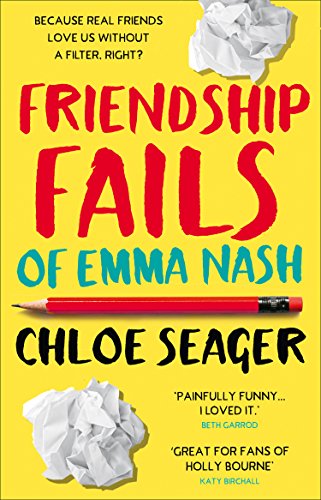When I started writing Friendship Fails of Emma Nash and Emma began her mission to make a new friend, my immediate thought was that she would target girls (which she does, to begin with.) I had always expected her new friend would be female. A few months into the writing process, I suddenly thought…hang on a minute…Why?!

Chloe Seager discusses the differences in friendships
A large part of writing - for me - is getting to know my own preconceptions. I started thinking about why I - and through me, Emma - wouldn’t have considered targeting a boy as a new pal. And it got me thinking about my own friendships. I had male friends as a teenager, but most of my best friends were my own gender. Having analysed the people in my immediate circle, I think I can say this is true of most people I know.
You only have to watch Love Island on ITV2 - an interesting snapshot of a completely straight mini-society - to realise it’s a pattern. Often girls naturally gravitate towards other girls as their confidantes, and boys towards boys. (The exception this year being Samira and Alex, forced together by a mutual lack of romantic interests in the villa.) Obviously being the same gender naturally gives you something in common, but plenty of men and women have loads in common - can it really be that simple?
The most common explanation I’ve heard is that sexual attraction inevitably gets in the way. But when I took a moment to look back on my own experiences, I ended up thinking how untrue that was. I’ve had a couple of friendships ruined by ‘becoming something else,’ to say I haven’t would be a lie, but to say that happened every time would be ridiculous. It would be like suggesting all straight people could potentially be attracted to one another. (If only dating were that easy.)
When I look back on the male friendships from my teen years, I think what often slowed their progress for me wasn’t the actual potential of romance, but everyone else’s perception of the potential for romance. When I laugh with a girl, I’m just laughing. When I laugh with a guy, suddenly I’m ‘flirting.’ My friendships with girls went unquestioned, but with guys, everyone always had an eye on whether we might ‘secretly be in love.’ I don’t think my Mum ever batted an eyelid when I brought a girl back to the house, but when I brought a boy back, upstairs was a no-go zone. I’m not saying my Mum was wrong about that, parenting teenagers must be difficult - but how is any friendship really supposed to flourish in amongst all that awkwardness, speculation, and ultimately restriction?
There’s a lot to say about this topic; Friends spent ten whole series debating this very issue. But I think for me, one of the reasons my male friendships as a teenager never went past a certain limit was because it was expected that I made friends with girls, but not boys. Making friends with the opposite sex is a constant challenge of society’s expectations and ten times more exhausting, especially when you’re sixteen. Midway through writing this book, I decided Emma was going to push through all that, and make a straight male bestie. Because I couldn’t think of one good reason why she shouldn’t.


